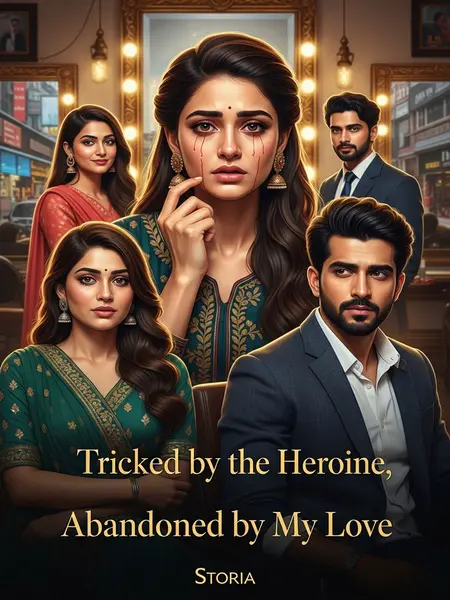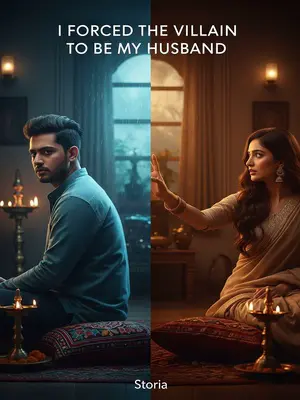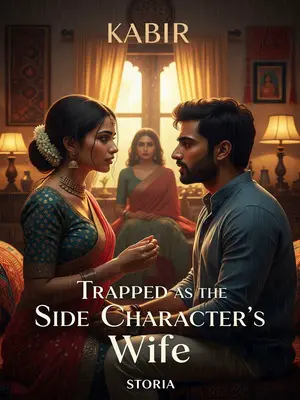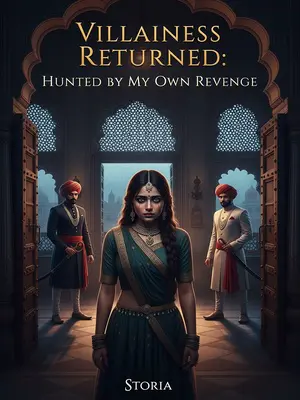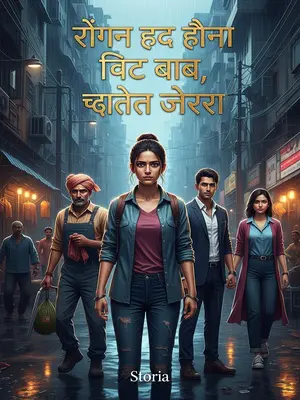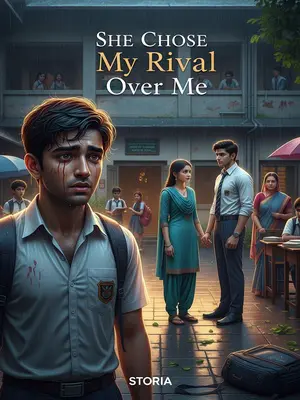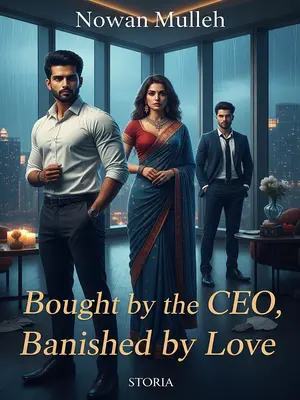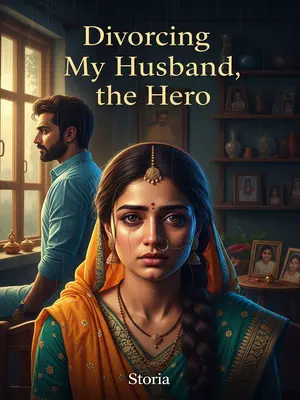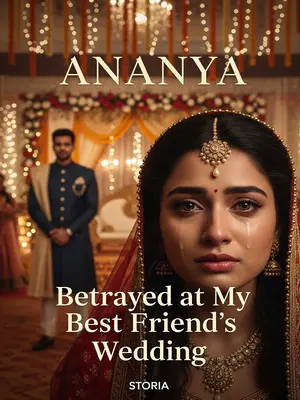Chapter 1: The Nail Salon Incident
The whirr of the ceiling fan mingled with the sharp scent of acetone as I slid into the cracked vinyl chair, Kabir settling in beside me like a silent bodyguard. His phone screen glowed, thumb flicking through Instagram, but every now and then he'd glance up and ask, “Chai leke aaun? AC thanda toh nahi lag raha, na?” The salon buzzed with the everyday chaos of India: plastic-wrapped magazines with Kareena Kapoor on the cover stacked on a wobbly table, WhatsApp voice notes pinging from a beautician’s phone, two aunties at the back arguing over maroon shades for sangeet outfits, and a little girl swinging her legs impatiently as she waited for her mother. The chemical tang of nail polish remover hung in the air, mixing with the distant clang of a pressure cooker from the alley and an old Bollywood number crooning on the radio. It was all so ordinary—almost comforting.
I picked the ₹799 full rhinestone style, trusting the chart taped to the wall. But the manicurist, eyes on her own phone, covered all ten of my nails with glittering Swarovski crystals—₹1,200 each, she’d soon claim—mistaking my order for something much grander.
At first, I didn’t even notice—the bright white LEDs above made everything shimmer, and I just thought, ‘Arrey, maybe they’ve upgraded their stock!’ Only when I glanced up at the bill did my heart lurch, that sinking feeling you get when a Mumbai BEST conductor says, “Change nahi hai!”
At the counter, she asked me to pay an extra ₹58,880 to make up the difference.
My stomach twisted. That kind of money could cover my semester’s rent and still leave enough for a samosa party at the college canteen. The manicurist’s voice was all business, as if demanding that amount was as routine as passing the salt at dinner.
Just as I tried to collect my thoughts, a barrage of comments—like lines from a live-stream, but only in my mind—flashed before my eyes: “Arrey wah, our clever little heroine! The supporting girl is too embarrassed to argue in front of the hero and can only quietly pay.”
I blinked, confused, but the lines kept coming, as though the entire mohalla had a group chat in my head: “The hero will definitely be impressed by the heroine’s stubborn spirit.”
“That clueless supporting girl doesn’t even know yet, but in the future, the heroine will spend her money, steal her man, and even her child will call the heroine ‘mummy.’”
1.
After speaking, the manicurist proudly flashed the UPI QR code, expecting me to pay. She tilted her phone with a practiced flick, a hint of smugness in her eyes—like a Lajpat Nagar shopkeeper convinced you can’t bargain lower. The QR code glowed, waiting for my trembling hand. Even the aunty next to me paused her gossip, eyes full of curiosity and silent judgement.
The barrage kept coming: “The heroine is so smart—now she’s got next semester’s fees!”
“Poor heroine, her family is struggling and her father’s a gambler. She can only skip class to work. If only she’d met the hero sooner.”
“Doesn’t anyone think what the heroine did is a little wrong? If it were me, I definitely wouldn’t pay so easily.”
“Yeah, how is this any different from cheating?”
When I didn’t move, the manicurist raised her voice. “What? Planning to skip out on the bill?”
It was peak hours, and people nearby turned to look at me, clearly swayed by her words, thinking I was trying to get away without paying.
Suddenly, it felt as if the whole colony was watching me—ladies waiting for their waxing, college students giggling behind their phones, even the peon fixing the AC, all staring, hungry for drama. The weight of ‘log kya kahenge’ pressed on my shoulders, as heavy as the prickly heat on a May afternoon.
I ignored them and said, “Since you put on the wrong crystals, just remove them one by one and put on the original rhinestones I ordered.”
I calmly sat down and stretched out my hand, crossing my arms and tapping my foot—just like Mummy does when the sabziwala tries to overcharge.
My voice stayed steady, but inside, my heart pounded. There’s a stubbornness born of Indian queues and ration shops, and I stared the manicurist straight in the eye, refusing to back down.
Earlier, when she was trimming my nails, she’d cut my skin by accident, making it bleed. She didn’t even apologize, blaming me for moving and wasting her time.
The sting still lingered—a sharp bite, redness blooming under my thumb. She’d muttered under her breath, but never said sorry. I had winced and kept quiet, not wanting to create a scene, fixing my dupatta and focusing on my phone to distract myself.
Seeing she was about my age, I’d guessed she must be short on money and working part-time, so I was patient. But my patience only gave her an opening to take advantage.
‘Sab ko mauka milta hai, na?’ I’d thought, giving her the benefit of the doubt. Maybe she had a family waiting at home. But in our country, sometimes people mistake patience for weakness. I was starting to see it now.
“Your style of rhinestone was out of stock, so I used these instead.”
Her tone was casual, like saying, “No onions in the curry today, only tomatoes.” She shrugged, hands on hips, bangles jingling, slicing the air.
“I can tell your clothes aren’t cheap, and your bag is worth nearly two lakhs. Five thousand rupees is nothing to you, but to some people, it’s life-saving money.”
I glanced at my bag—a gift from Maasi, meant for job interviews, not flaunting at salons. But she’d already decided who I was, eyes glinting with judgement. In India, one look at your things and your whole life story is written.
The barrage surged: “Yeah, yeah, evil supporting character, hurry up and pay! Don’t keep babbling and delay our little sister heroine from earning money.”
“Wuwuwu, the heroine is so pitiful, I want to donate to her.”
“Hero, hurry up and show up—then the supporting character will pay immediately.”
“Am I the only one who thinks the heroine is emotionally blackmailing people…”
People nearby chimed in: “Since she already put them on for you, just pay the difference.”
A middle-aged woman with mehendi still drying piped up, “Beta, so much argument for nails? Just pay and go, na. Time is money, hai na?”
“Yeah, yeah, this girl worked so hard, sticking on all those tiny rhinestones for two hours.”
Priya, emboldened, went on sarcastically, “I think you just want to freeload. These rhinestones are so shiny, anyone can tell they’re not ordinary glass. If you didn’t stop me, doesn’t that mean you agreed to it?”
She folded her arms, lips curled in a smirk, as if she’d already won. I looked around—the crowd was on her side, enjoying the drama.
I glanced at the time—self-study was about to start. I couldn’t keep arguing, so I said, “How about this: just remove them, no need to replace.”
The clock was ticking, and missing self-study meant risking my notes getting snatched by the class topper. I tried to keep my tone even, not wanting to lose my cool.
“Fine, removal plus labour loss fee comes to ₹30,000 total. Scan my code first.” She held out the UPI code again.
It was almost laughable, the way she thrust the code under my nose—like a Diwali mela hawker who won’t let you leave without buying. Only in India do you get charged so much for undoing someone else’s mistake.
2.
I was so angry I laughed—a short, bitter bark that made the aunty next to me flinch and whisper, “She’s gone mad, I think.” The absurdity of it all—her confidence, the crowd, the bill—was enough to make anyone laugh or cry, and today, laughter was my shield.
Who was wasting whose time? I’d sat for two hours, my nails were crooked, my hand was cut, and the rhinestones were stuck on all lopsided.
My hand throbbed, skin pink and raw, each rhinestone sitting like a tiny taunt. I flexed my fingers, resisting the urge to wipe them off right there. Even the parlour mirror reflected my frustration—a deep frown, eyes narrowed in disbelief.
She really thought I was a pushover.
Just as I was about to lose my temper, a familiar voice called out.
“Neha, are your nails done? I came to pick you up for dinner.”
Kabir’s voice—smooth, cheerful, slicing through the tension. Heads turned. Even the man sweeping hair at the entrance straightened up, sensing drama.
The barrage was so thick it nearly blocked my vision.
It was as if the whole mohalla was tuned in: “Arrey, the hero is here!”
“Our little sister heroine’s saviour has arrived…”
“Let’s see if the supporting character dares keep talking! Hurry up and give the money to the heroine, her time is precious. ₹30,000 is too little, honestly.”
Kabir walked over, noticing the tension.
He raised an eyebrow, that typical engineering-college confidence oozing out, as if he could solve anything with jugaad. He scanned the scene—me, the manicurist, the crowd—piecing it together.
“Neha, what’s going on?”
But Priya cut in: “Sir, your girlfriend did her nails at our parlour and now wants to pay on credit. Her bag alone is worth almost two semesters of my fees. Please, just settle the bill.”
She pursed her lips pitifully, even squeezing out a few tears.
Her act was straight out of a daily soap—one hand dabbing at invisible tears, voice trembling just enough. Even the old man who brought chai muttered, “Bechari ladki, must be tough for her.”
The kind-hearted people around felt even more sorry for her. “What a shame, really. The rich feast while the poor go hungry. You don’t lack this bit of money—just pay, consider it a good deed.”
A chorus of murmurs: “Beta, Bhagwan sab dekhta hai. Karo ek accha kaam.” Their eyes weighed me, all judgement and sympathy, as if I was being measured before a family panchayat.
Doing a good deed and being extorted are two different things.
I’m not short on money, but I’m not a fool. Getting scammed and then feeling sorry for the scammer—what kind of logic is that?
Kabir tried to persuade me. “Neha, it’s getting late. Let’s just let it go.”
“Can I pay you later? She did work hard for two hours on the nails.”
“Everyone’s having a hard time. Take a step back and everything will be fine. As the saying goes, letting go is a blessing.”
It sounded like something straight from his mother’s WhatsApp forwards, always urging patience, never confrontation. I looked at him, half-expecting another proverb or, “After all, we’re all human, na?”
No need to look to know the barrage was boiling again.
All scolding me as the evil supporting character, all praising Kabir for being gentle and kind.
But I was clearly defending my own rights—was that so wrong?
Just because I’m not the so-called heroine, do I have to swallow my losses willingly?
Priya wiped her tears and continued, “Sir, you really understand how hard it is for us part-timers. How about this: let your girlfriend get a membership card, deposit ₹1,00,000, and today’s rhinestones are free. After that, every manicure is 20% off.”
“This is already a great deal—I’m secretly giving you this discount while the boss isn’t here. Pay quickly! If the boss comes back, she definitely won’t agree.”
She handed me the UPI code for the third time.
Her persistence was almost impressive, like a salesman at a Diwali mela who won’t let you pass without trying the lucky draw. I could see the greed in her eyes—this was her jackpot moment.
I snorted and pushed the code away.
“I think you’re obsessed with money. Since we can’t talk this out, I’ll call the police and let them decide whether I’m freeloading or you’re extorting.”
The word ‘police’ was like a thunderbolt—everyone went quiet for a split second, eyes wide, as if I’d threatened to bring the principal into a classroom fight.
Just as I was about to call, Kabir grabbed my hand and whispered, “Neha, is this really necessary? She’s just charging the listed price. I checked—the rhinestones are this price. You should pay.”
His words stung sharper than the antiseptic the manicurist dabbed on my cut finger. He squeezed my hand, trying to be gentle, but it only made my anger boil hotter. Always the peacemaker, but never on my side.
As soon as I mentioned calling the police, Priya dropped her arrogance and looked at Kabir, pitiful and aggrieved, seeking his help.
She clung to his sleeve, her voice barely above a whisper. “Sir, I’m really just a poor student working part-time. My father is seriously ill and waiting in the hospital for money to save his life. Does your girlfriend really have to push me to the brink?” She even gently tugged at Kabir’s sleeve.
The barrage boiled again.
“Arrey, the heroine crying is so pitiful and cute, I love it.”
“Haye Rabba, if I were the hero, I’d definitely hug Priya and spoil her.”
“The author always pairs everyone off, good or bad.”
Kabir seemed convinced. He pulled my arm and said, righteously, “Neha, if you won’t pay, then I will. But after this, we’re done. I don’t want a girlfriend like you.”
His words rang out in the parlour, louder than the mixer-grinder at breakfast. I could feel the tension in the air—some people pretending not to listen, others holding their breath, waiting for my reaction as if they were watching a cricket match in the final over.
3.
“Fine, I agree. You should pay—after all, you’ve gotten more than this from me.” I shook off Kabir’s hand.
There was a heaviness in my voice—like the time I told Papa I’d had enough of his drunken promises. I looked him straight in the eyes, daring him to walk away. Years of giving, forgiving, swallowing my pride—it all boiled over in that moment.
Then I decisively called the police.
My fingers didn’t tremble as I dialed 100. The manicurist’s face blanched, and even Kabir looked as if he’d been doused with a bucket of cold water. The aunties began to mutter nervously, already planning what to tell their husbands at dinner.
Now both of them were stunned.
Kabir clearly regretted his outburst and tried to make amends.
His voice softened, “Neha, yaar, forget it… let’s talk outside?” But I ignored him, eyes fixed on the entrance, waiting for the police van’s red beacon to appear.
After all, he still needed my help with the experimental part of his graduation project.
I remembered the long nights in the lab, hunched over beakers and data sheets, while he sat beside me, yawning, only half-interested. All those times he promised, “I’ll help next time, pakka.”
Without my experimental data, he’d have to delay his graduation this year.
If he upset me at this critical moment, he’d lose more than he’d gain.
The police and the parlour owner arrived almost at the same time.
A short, pot-bellied constable walked in first, his boots squeaking against the marble floor, and the faint smell of paan trailing behind him. The parlour owner—an elegant woman in a crisp cotton saree, red bindi shining—stormed in behind him, eyes blazing.
The owner was baffled—she’d just gone to a parent-teacher meeting, and returned to find such a mess in her parlour.
She put her handbag down with a thud, scanning the room as if she’d come home to find the kitchen on fire. Her glance at Priya was icy cold.
She asked the police to get the details.
She glared fiercely at the manicurist, who was still smug, thinking she’d brought in a big business deal.
But she hadn’t considered that with the parlour next to a college, if prices were too high, they’d lose most of their student clientele.
The constable grunted, “Madam, what is all this tamasha for a few nails? Overcharge toh chalta hai, par yeh kya dhandha hai?”
It was like picking up peanuts and dropping a watermelon.
The owner’s face softened when she looked at me, her voice gentle, “Beta, college students are our bread and butter. If you stop coming, we’ll be left with only aunties who want oil champi.”
“Madam, this is all my fault. I was too lax in managing my staff, which led to today’s mistake. I apologise. This manicure is on the house. Next time you come, I’ll do it myself and give you a 30% discount. Would that be all right? Please, let’s not trouble the police.”
Her folded hands, the humility in her tone—so different from Priya’s arrogance. There was a softness, a willingness to make things right, and suddenly, the tension in the room eased a bit. My shoulders slumped, the fight draining out of me like air from a punctured tyre.
“Ma’am, your management needs a fundamental fix. I think this trainee shouldn’t work here anymore, right?” I said, looking at Priya. I crossed my arms, tapping my foot as Mummy would when the sabziwala tries to overcharge.
I met Priya’s eyes, holding her gaze with a quiet resolve. There was no gloating—just a calm assertion, the kind that says: Enough is enough.
The owner nodded, took out her phone, tapped a few times, then glared at Priya. “Priya, here’s your pay for today. Take the money and go. Our little parlour really can’t keep you.”
Her words hung in the air, final and unforgiving. Priya’s lower lip quivered, but the owner’s mind was made up. She handed her an envelope, not even bothering to count the notes.
Priya clearly didn’t expect things to end this way—she was both angry and unwilling.
She tried to argue, but the police officer cut her off: “If you don’t want to leave, come with me. Fraud can get you detained and fined triple, and in serious cases, you can be sentenced.”
The constable’s tone was stern, his hand hovering near his lathi, making it clear this wasn’t just empty talk. Priya shrank back, clutching her bag.
She had no choice but to shut up.
Her silence was thick, the kind that comes only after all arguments are lost. She slunk out of the parlour, shoulders hunched, the gossip trailing after her like a stray dog.
I accepted the owner’s compensation and quickly left the parlour—self-study was about to start.
I clutched my books tightly, hurrying down the street. The late afternoon sun was hot, the sound of autos honking mixing with the distant ring of temple bells. I didn’t look back, not even when I heard Kabir calling my name.
No need to guess, Kabir would definitely go comfort Priya.
In my mind, I could already see them standing under the gulmohar tree outside the salon—him offering her his handkerchief, her crying into it, their story beginning as mine ended.
The barrage started flying again:
“Yaar, am I the only one who thinks the supporting character is kind of cool?”
“Not just you, I feel the same way. The supporting character is so cool and decisive.”
“This heroine is way too much of a delicate flower.”
“So what if she is? Priya has the hero to rely on, she has the right.”
“Arrey, the hero is comforting the heroine—so sweet.”
Let those two scumbags be together, just don’t get in my way.
I squared my shoulders, refusing to let regret weigh me down. For once, I wasn’t the doormat everyone expected me to be.
As I walked, I took the chance to carefully read through the barrage and sorted out my thoughts.
With every step, the voices grew fainter, replaced by my own—the voice that had been silenced for too long.
I stepped into the heat, nails sparkling and heart bruised, not sure which would last longer.
